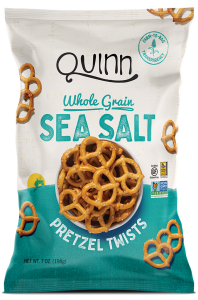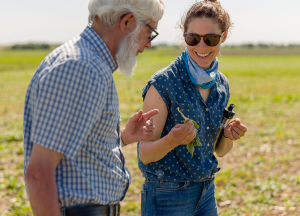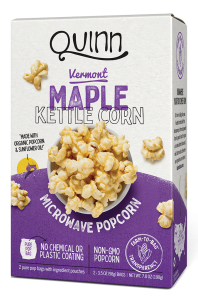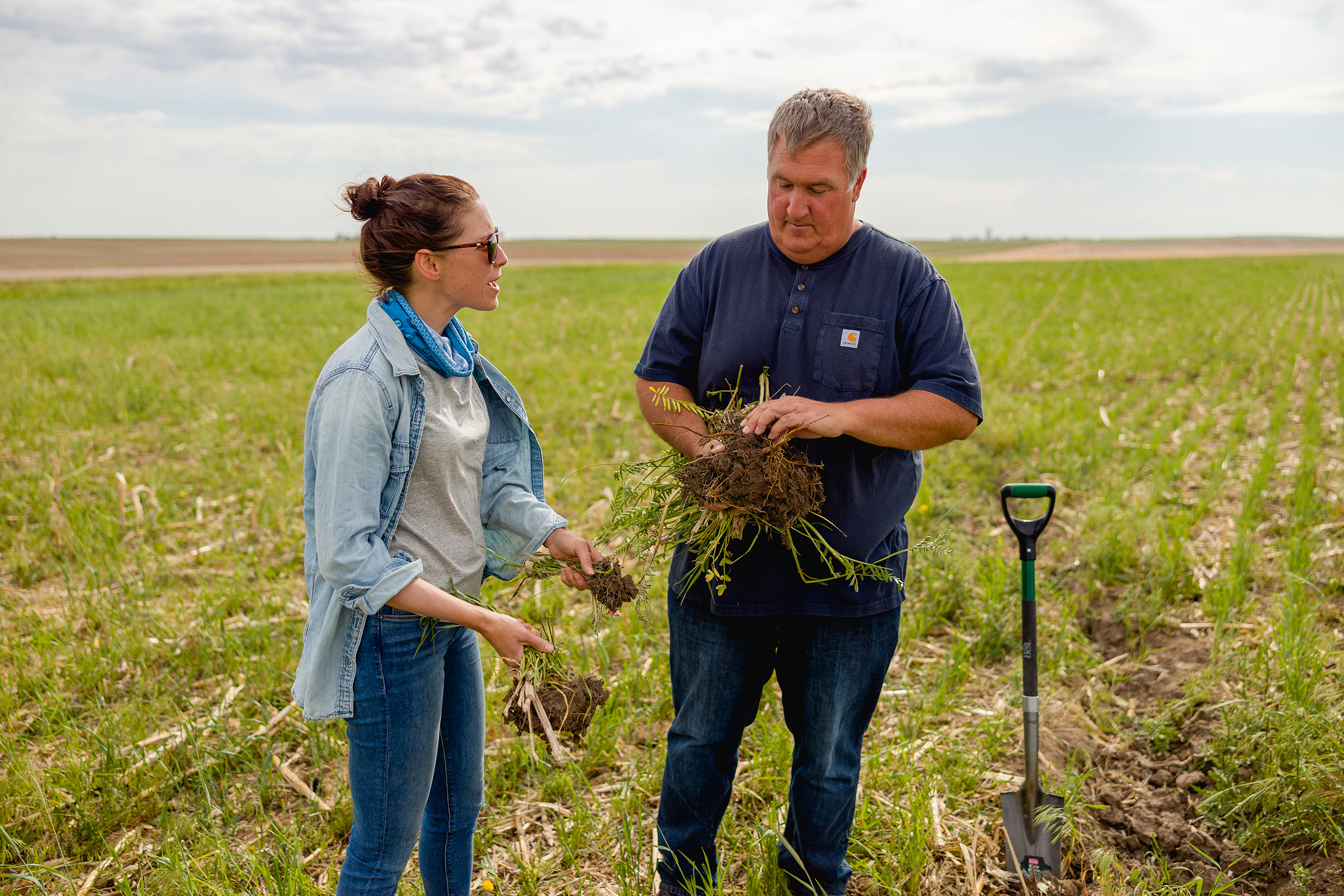A growing number of food companies, particularly smaller brands, are connecting with regenerative farmers to produce high-quality, nutrient dense foods, while helping to build markets for regenerative crops and supporting the farmers.
“We couldn’t have done any of this without him”
A good example is Colorado-based Quinn Snacks. Owner Kristy Lewis started the company 10 years ago when her son Quinn was born. Her goal was to “clean up” microwave popcorn with its use of harmful chemicals.
“There was such a disconnect between what I was making on the stove, like pure popcorn and butter or oils, and what was available in the marketplace,” she says.
Her quest for a better popcorn product led her to connect with Dave Vetter, an organic farmer and owner of Grain Place Foods, an organic processing facility in Marquette, Nebraska. Lewis found Grain Place on Google and called them.
Vetter remembers the conversation. “She was telling me what she wanted to do and why. She had a tall target, and I thought if anybody’s going to make it work, it’s probably her,” he says.
Lewis visited Vetter’s 285-acre Nebraska farm, and the visit opened her eyes to the possibilities of regenerative organic agriculture. Vetter grows a diverse mixture of crops such as popcorn and soybeans along with cover crops, integrates livestock to improve soil health, and has long, nine-year crop rotations.
“It’s such a magical place,” she says. “There’s so much diversity and life; it’s how our planet should be. He’s doing everything the way mother nature intended it. There’s so much that I took to heart with that.”
That began the partnership between Grain Place Foods and Quinn Snacks that continues today and offers a case study in how food brands can connect directly with farmers to source organic and regeneratively produced crops.
Grain Place Foods supplies about a million pounds of popcorn to Quinn each year. Vetter has a network of four farmers who grow the popcorn, which is processed at Grain Place Foods.

Many of Quinn Snacks are Non-GMO Project Verified
Quinn produces several microwave popcorn products, pretzels, and pop-at-home popcorn kernels. Many of the products are Non-GMO Project Verified.
Vetter says the partnership with Kristy Lewis and Quinn has been good.
“They are a start-up, and they’ve had struggles. We tried to figure out how to make it work for them, and we’re glad it has worked.”
Lewis says Dave Vetter and Grain Place Foods have been key to Quinn’s success. “We couldn’t have done any of this without him. He was a huge believer in what we were doing.”
Greater transparency for consumers
More and more food brands like Quinn are working directly with farmers to source regenerative or organic ingredients. Canadian organic cereal manufacturer One Degree Organics touts on its website: “all ingredients from farmers we know.” Minneapolis-based muesli manufacturer Seven Sundays sources organic oats and other grains from farmers in Iowa and Minnesota as part of a larger project to increase small grain production in the Midwest. Oat milk manufacturer Oatly is also involved in the project and is sourcing oats directly from Midwest farmers. Applegate Farms promotes its partnership with Amish organic dairy farmers in Kalona, Iowa on its Non-GMO Project Verified cheeses.
Consumer transparency is an important advantage to the farmer-brand relationship.
“Kristy is all about transparency,” Vetter says. “You know what the farmers are producing for you and can communicate that to consumers.”

Dave Vetter, owner of Grain Place Foods and Kristy Lewis, owner of Quinn Snacks
Quinn promotes its partnership with Vetter and Grain Place on its website, and another website page describes the sources for all of its ingredients.
“That was about sharing where everything was being grown, who was growing it, and even things that we weren’t proud of, but we at least wanted to communicate that to our consumers and be transparent about it,” Lewis says.
“How do we get farms to move to regenerative?”
Inspired by Dave Vetter’s commitment to regenerative agriculture, Lewis wants to work with other farmers who share the same commitment. Quinn’s “Be Better. Do Better” initiative is all about advancing regenerative agriculture.
“We want to work with our growers on wherever they are today, and how they can push themselves to do things differently that’s better for their land, for them, for their family, and for their communities,” Lewis says. “How do we get farms to move to regenerative?”
Food brands can play a key role in building those relationships and advancing regenerative agriculture.
“If brands like us don’t set different paths, change won’t happen,” she says. “Larger CPG (consumer packaged goods) brands are doing so much good, but it’s also up to the smaller brands to take initiative because we’re nimble and can do things quicker.”
Last spring, Lewis connected with Steve Tucker, a regenerative farmer in western Nebraska. Tucker farms 4,000 acres, “3500 acres too much,” he jokes and grows non-GMO corn, oats, millet, and pulse crops like peas and chickpeas. Like other regenerative farms, Tucker’s is diverse. He grows 14 different crops including cover crops and cover crop seeds and raises livestock including cows and pigs as well as chickens.
“We’re very diversified and follow the principles of soil health,” Tucker says.
Tucker grows non-GMO corn because he says there is increasing demand for it, and because he doesn’t need the GMO traits such as herbicide tolerance and insect resistance. He’s also gotten better yields with non-GMO seeds.
“We are so diverse with cover crops that there’s no need for that stuff,” he says. “We work with nature instead of playing God.”
Tucker defines regenerative agriculture as “the ever-increasing ability to make things better than they were yesterday, from the soil to the agriculture system, farming communities, and quality of life.”
“It’s really restoring the soil and the land and creating those mini oases like Dave Vetter has at Grain Place,” Lewis says.
“We can make this a win-win for everybody.”
Tucker is aligned with Lewis’s vision for regenerating agriculture and building farmer-brand relationships.
“There’s a disconnect between brands and farmers, and we’re trying to fix that,” he says. “I can bring the farmers in and go to the brands and then tell the farmers this is what you need to grow. We can make this a win-win for everybody.”

Quinn Vermont Maple Kettle Corn Popcorn
In June of last year, Lewis asked Tucker to plant a test field of 85 acres of sorghum for a Quinn pretzel product. Unfortunately, an early frost “dinged” the crop, Tucker says.
Despite the setback, Tucker and Lewis are still excited about working together. She has other crops she wants Tucker to grow.
“They care about their products and helping me achieve success on my farm. We forged a great relationship,” Tucker says.
Lewis says: “Steve was completely willing to try to grow sorghum on his land. He’s learning every day as we’re learning. It was just a good partnership out of the gate.”
Tucker plans to build a processing facility for regenerative crops and ingredients. He aims to link food brands with other regenerative farmers and build a market for their crops.
“I have producers lined up, and they will grow what’s needed as long as they have a place to deliver their crops to, and companies will utilize them,” he says.
Tucker hopes to start construction on the facility this spring. “Food companies want to partner with a producer. I want to do the processing,” he says.
He envisions creating processing hubs where regenerative farmers could deliver their crops and earn a premium.
“Let’s move regenerative crops from a commodity to something that has more value for the market,” he says.
His goal is ambitious: to increase the adoption of regenerative agriculture practices, build the market for regenerative products, offer higher prices to farmers for those products, and increase the connections between brands and farmers.
“This is doable,” he says.
Lewis admires Tucker’s vision and looks forward to working with him to make it a reality. “We care about each other. It’s all about relationship and building trust. Both of us want to make this a win-win.”





